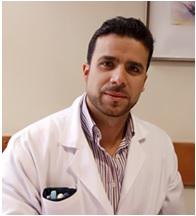
Interview with pulmonologist dr. Pedro Ferreira
Dr. Pedro Ferreira works as a pulmonologist in Baixo Vouga Hospital Centre, Portugal. As head of the Outpatient Clinic for patients with interstitial lung disease (ILD), he sees a lot of patients with idiopathic pulmonary fibrosis (IPF). According to Ferreira, it is crucial to treat the whole IPF-patient and not just the disease. ‘We need a care strategy that is based on the needs of the patients and their family.’
Caregivers
When talking about IPF, Ferreira quickly makes it clear how important structured relationships are for IPF-patients. ‘I can see that the patients surrounded by strong caregivers can cope more easily than people that are alone’, Ferreira says. ‘Take for example people that are divorced or have been widowed. They have a harder time accepting the disease and learning to cope with it, than people with a caring partner. All in all, their quality of life tends to be worse.’ It is therefore essential, according to Ferreira, to target caregivers towards a supporting role. ‘They have an important function in the therapeutic strategy, for emotional support, for helping the patient in difficult day-to-day life adjustments but also for other pragmatic situations. Patients need to be driven to hospital appointments, and medication needs to be picked up at the pharmacy. Of course, not everybody has such a social network, which makes a multidisciplinary team assessment even more important. Enrollment in Patient Support Programs could also have a beneficial impact on adherence and, possibly, in downstream clinical outcomes.’
Multidisciplinary approach
‘A collaborative multidisciplinary framework is incredibly important’, Ferreira says, ‘both in the diagnostic phase and in the treatment process’. There are lot of things you will eventually require as an IPF-patient. This means that during treatment you not only need a specialized chest physician and judicious decisions taken by the multidisciplinary team but, throughout time, you may eventually need to be geared towards a rehabilitation program, cardiac evaluation, psychological support, nutritional intervention, etcetera. Even assessment of sexual dysfunction could be important for some patients.’
Dealing with the disease
‘We need to educate the patient and his surroundings about the disease’, says Ferreira. ‘In the end, the aim is empowerment: the patient has to feel some kind of control over his disease, with the help of the team and his caregivers.’ Because not every patient is the same, and patients go through different coping phases in their disease, doctors and other professionals have to make continuous assessments of what (psychological) state the patient is in, to not risk losing compliance with the therapeutic strategy.
‘Some patients are very literate’, Ferreira says. ‘They quickly learn everything there is to know about IPF. Most of the patients, however, need a little more help with this. And there also are the different phases of accepting the disease. After hearing the diagnosis, patients often at first are confused. After the initial confusion, they often start to passively work with the disease (undergo the treatment) and, in the end, they take on a more proactive role. This last step is crucial, because patients should preferably show ownership of their treatment.’
Trials beyond disease-modifying drugs
‘Regarding quality of life improvement and symptom control very few interventions are currently evidence-supported’, Ferreira says. ‘That is why most of the recommendations today at this level are based on expert opinions or are derived from other diseases such as lung cancer and chronic obstructive pulmonary disease.’ According to Ferreira, this urgently needs to change. ‘These kind of interventions in IPF need to be studied in adequate clinical trials and real-life cohorts. A renewed positioning of palliative care is of paramount importance in IPF. Both disease-modifying treatment and palliative care should be offered to IPF-patients early and simultaneously throughout the disease course, with the emphasis gradually moving towards the latter in advanced disease.’
Dit interview is geschreven voor Belung Magazine, een uitgave van Boehringer Inghelheim
